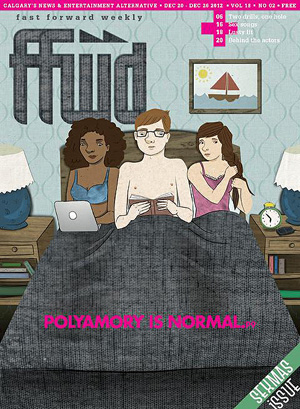
A recent study by relationship researcher Terri D. Conley and four colleagues at the University of Michigan concludes that there is no evidence to suggest that monogamous folks are any more satisfied than non-monogamous ones.
The study is a review of other research on consensual non-monogamy, and appeared in Personality and Social Psychology Review with the title A Critical Examination of Popular Assumptions About the Benefits and Outcomes of Monogamous Relationships.
After reviewing the research, the study concluded a few things: that "sexually unfaithful" individuals were less likely to use barrier methods than consensually non-monogamous (CNM) individuals; that gay men in CNM relationships felt a comparable level of satisfaction to gay men in monogamous relationships; and that jealousy was lower, more manageable, and less problematic for people in CNM relationships. The study elaborates:
Men reported that their open relationships accommodated their intimacy needs as well as their desires for sexual diversity. Moreover, the men in these partnerships often felt more intimate with their partner when they agreed to be non-monogamous. Just as monogamy can provide a sense of support and protection, consensual non-monogamy can provide the emotional support of a primary partnership while also allowing exploration of other sexual relationships.
Over at Psychology Today, Bella DePaulo summarizes the study's findings in a series of three posts: Are Monogamous Relationships Really Better?, Satisfied? Jealous? On Deciding Not to Be Monogamous, and Is Polyamory Bad For Children?.

 The December/January issue of PQ Monthly, a print and online publication for the LGBTQ communities of Oregon and SW Washington, featured an article called "
The December/January issue of PQ Monthly, a print and online publication for the LGBTQ communities of Oregon and SW Washington, featured an article called " Fast Forward Weekly is a progressive newspaper distributed to 1,300 coffee shops, restaurants, stores, and other locations around Calgary, Alberta. A couple weeks ago, a story on polyamory made it to the cover, along with the words "POLYAMORY IS NORMAL."
Fast Forward Weekly is a progressive newspaper distributed to 1,300 coffee shops, restaurants, stores, and other locations around Calgary, Alberta. A couple weeks ago, a story on polyamory made it to the cover, along with the words "POLYAMORY IS NORMAL."